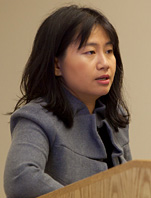This website uses cookies
We use cookies to ensure that we give you the best experience on our website. If you continue to use this site we will assume that you are happy with it.
In 2007, the city of Fuzhou, in southern China, launched a campaign to turn its Lanes and Alleys neighborhood into a tourist-friendly historic district. Attendant upon this project were the sort of mass evictions and demolitions that have rankled communities throughout China in recent years, the flip side of the impressive infrastructural achievements that have become iconic of Chinese might. As Julie Chu explained to a Law School audience on November 2, the point where the demands of infrastructural progress meet the resistance of those in its path has become a crucial site for grappling with state power.

Julie Chu, Assistant Professor of Anthropology, the University of Chicago
Chu, Assistant Professor of Anthropology at the University of Chicago, is a socio-cultural anthropologist and author of Cosmologies of Credit: Transnational Mobility and the Politics of Destination in China (Duke University Press, 2010). Her current project examines border technologies and the various infrastructures for managing the flows of people and things between Southern China and the United States. Her lecture, “When Infrastructures Attack: The Politics of Disrepair in China,” presented through the Clarke Program in East Asian Law and Culture Colloquium Series, was drawn from field research in Lanes and Alleys.
Chu took this neighborhood as a case study of the evolving tactics and results of demolition in China. Following a wave of governmental land acquisition that manifested in dramatic scenes of demolition–and provoked equally dramatic scenes of protest–local governments wary of bad publicity have taken to employing small, furtive demolitions, couching their tactics in legal terms, and ostensibly providing legal channels of objection, said Chu. She observed that the new regime has largely served to contain rather than ameliorate the grievances of displaced residents, but she suggested that it also seems to be incubating creative forces. Though judges and bureaucrats are stymied by pressure from above, dogged petitioners pursue their suits as instruments of media outreach and community engagement. Through casual meetings in court hallways and surreptitious asides, meanwhile, officials are offering guidance. It is in these interstices of “productive disconnection,” says Chu, that real legal reform is occurring.
“Julie Chu’s work gives us a highly nuanced view of what is the emerging Rule of Law in China, in all its contradictions, complexities, and potentialities,” says Annelise Riles, Jack G. Clarke Professor of Far East Legal Studies and Director of the Clarke Program. “Her research takes us from the ordinary person’s experience of the law to the experiences of judges, prosecutors, lawyers, and other elites. The paper was an exciting demonstration of the value of ethnographic research in understanding emerging legal institutions.”
The Clarke Colloquium Series is presented by the Clarke Program in East Asian Law and Culture, funded by a gift to Cornell Law School by Jack Clarke LL.B. ‘52 and his wife, Dorothea.
FALL 2011 COLLOQUIUM SERIES EVENTS